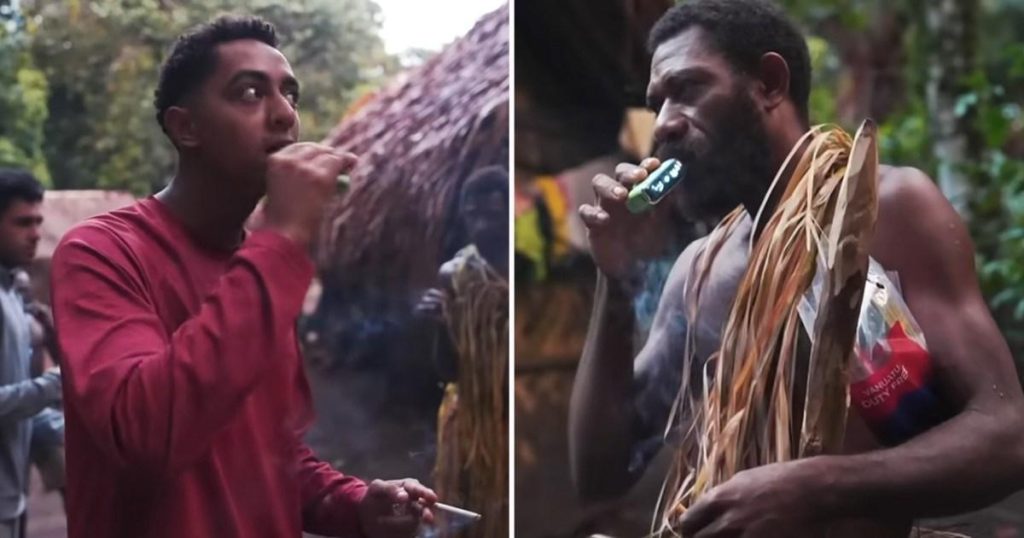The NELK Boys’ Controversial Encounter: A Deep Dive into the Ethics of Cultural Interaction
The NELK Boys, a YouTube collective known for their prank videos and boisterous antics, recently embarked on an expedition to a remote Pacific island near Fiji, purportedly inhabited by an "uncontacted tribe." Accompanied by adventurer and YouTuber Forrest Galante, their encounter, documented in a 40-minute video uploaded on Christmas Eve, has sparked widespread controversy and ignited a debate on the ethical implications of interacting with isolated indigenous communities. The video, which has garnered millions of views, showcases the group’s interactions with the tribe, including the sharing of vapes, alcohol, and tobacco products. This act has been met with a barrage of criticism, with many accusing the NELK Boys of cultural insensitivity, exploitation, and potential harm.
The footage depicts the initial contact with the tribe, where the NELK Boys, armed with gifts and a sense of adventure, encounter the islanders, who initially appear wary and defensive, armed with bows and arrows. After a tense standoff, the chief grants permission for the group to enter the community. The NELK Boys spend time observing the tribe’s way of life, participating in hunting expeditions, and sampling their traditional food. In return, they offer gifts, including a bottle of bourbon for the chief, cigarettes, and, most controversially, a cherry-flavored vape pen. The video shows tribe members taking puffs from the vape, with one of the NELK Boys commenting, "He’s about to get hooked on them." They proceed to demonstrate how to blow clouds and even introduce snus, a smokeless tobacco product. This seemingly casual exchange of goods and practices forms the crux of the controversy.
The central issue at stake is the potential impact of introducing potentially addictive substances and foreign practices to a vulnerable community with limited exposure to the outside world. Critics argue that the NELK Boys’ actions demonstrate a disregard for the tribe’s cultural autonomy and well-being. The introduction of nicotine and alcohol, they contend, could lead to addiction and long-term health problems, disrupting the tribe’s traditional way of life. Furthermore, the act of filming and broadcasting the encounter without explicit consent raises concerns about exploitation and the commodification of indigenous cultures for online entertainment.
The NELK Boys’ defense, although not explicitly stated in the video, could potentially revolve around the idea of cultural exchange and the autonomy of the tribe members to make their own choices. They might argue that the tribe members were willing participants and that the exchange was mutually consensual. They could also point to the fact that the gifts were offered, not imposed, and that the tribe members were free to accept or decline. This line of reasoning, however, fails to address the power imbalance inherent in such encounters. The NELK Boys, with their advanced technology and access to resources, hold a position of privilege that could influence the tribe’s decisions.
The controversy surrounding the NELK Boys’ video highlights the complex ethical considerations that arise when interacting with isolated indigenous communities. The potential for harm, both physical and cultural, necessitates a cautious and respectful approach. Introducing foreign substances and practices can have unintended and potentially devastating consequences, disrupting traditional ways of life and creating dependencies. Furthermore, the act of documenting and sharing these encounters raises concerns about exploitation and the potential for misrepresentation.
The debate extends beyond the immediate actions of the NELK Boys to encompass broader questions about responsible tourism and the ethical obligations of those who interact with indigenous communities. It underscores the need for guidelines and protocols that prioritize the well-being and cultural autonomy of these vulnerable populations. The incident serves as a cautionary tale, reminding us of the potential for harm when cultural sensitivity and respect are disregarded in the pursuit of entertainment or adventure.
The NELK Boys’ encounter with the "uncontacted tribe" has ignited a crucial conversation about the ethics of cross-cultural interaction. It raises fundamental questions about the responsibility of outsiders to protect and respect the cultural integrity of indigenous communities. The incident serves as a stark reminder of the potential for harm when cultural sensitivity is sacrificed for the sake of online content and underscores the urgent need for ethical guidelines and responsible practices when engaging with vulnerable populations. The long-term consequences of this encounter remain to be seen, but the controversy it has sparked will undoubtedly continue to fuel the debate about the ethical responsibilities of those who venture into the world’s most remote and fragile communities.











